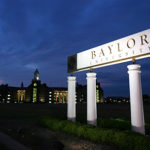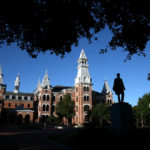WACO—Whether responding to controversy, revising curriculum or coping with a pandemic, every decision at Baylor University is considered in light of the school’s Christian mission, President Linda Livingstone asserted.
“Everything is judged by our mission,” Livingstone told the Baptist Standard in a wide-ranging interview on Sept. 28.
Livingstone accepted the Baylor president’s role three years ago at a time when the university faced multiple investigations regarding its handling of sexual abuse complaints, centered primarily on its athletic program.
Within a few months after her arrival, the Southern Association of Colleges and Schools Commission on Colleges lifted its warning sanction. About a year later, the Big 12 Conference fined Baylor $2 million for damage to the conference’s reputation, but it also verified the university was in compliance with conference bylaws and had “structurally completed and practically implemented” all 105 recommendations made by attorneys formerly with the Pepper Hamilton firm that probed Baylor.
Baylor adapts to COVID-19 context
In recent months, Baylor has faced challenges shared by other educational institutions across the country—coping with the health and safety concerns surrounding the COVID-19 pandemic.

At the time the pandemic hit in March, Baylor was “rolling along,” making progress in implementing its Illuminate strategic academic plan and the $1.1 billion Give Light fundraising campaign to support it, Livingstone said.
COVID-19 forced the university to adapt quickly and work through the challenges of delivering instruction virtually during the spring semester and then move to multiple delivery systems—in-person, online and hybrid models—this fall, she noted.
“At the end of the day, our mission trumps everything,” she said, pointing to principles Baylor’s regents and administration agreed upon early in the pandemic. “Our mission has to be priority—our Christian mission.”
Baylor committed to protect the health and well-being of students, faculty and staff and take necessary steps to create a safe and educationally fulfilling campus environment, she noted.
Sign up for our weekly edition and get all our headlines in your inbox on Thursdays
“Teaching looks very different now than it did, and it has required our faculty to work above and beyond what they ever thought they would do over the last six or seven months—to adapt and change and to learn how to teach in a different way,” she said.
A ‘caring community’ that maintains social distance
Baylor faces the continuing challenge of creating a “caring community” built on relationships during a period when “high-touch” programs are made difficult by social distancing requirements, Livingstone said.
In April, Baylor mobilized Bear Care coaches to check on students each week to help them deal with the stress of online education and adapting to the changing COVID-19 environment.
Recently, the Baylor Counseling Center launched “Quaranteam” support groups to help students deal with feelings of isolation and loneliness. For freshmen, the university also created small family groups of students to promote relationship-building in a time of social distancing.
Apart from the pandemic, Livingstone said the greatest surprise she has encountered in her first three years as Baylor’s president is the depth of care and concern the “Baylor family” has for the university.
“That’s why they react really strongly to things on our campus sometimes—both the good things and the more challenging things—because they love the university so much,” she said.
Chapel speaker sparks controversy
In February, a presentation by chapel speaker Kaitlin Curtice drew the ire of a student group and some parents and alumni. In a presentation infused with Native American spirituality, Curtice addressed God as “Mystery” and urged students to reject “toxic patriarchy” and “envision a decolonized spirituality.”
Livingstone attributed the controversial presentation to a “miscommunication” between the chapel speaker and a Baylor staff member.
“It was an unfortunate incident. It’s not what we would have wanted to happen,” she said. “It’s not anything that was done intentionally.”
As a result, the university implemented a policy to require an outline or manuscript from chapel speakers. It also put in place procedures to explore more thoroughly with guest speakers information about their ministries and emphases prior to extending an invitation.
“We are continuously looking at chapel—how it is working and things we need to do differently,” Livingstone said.
She pointed to an ongoing Spirituality and Character Formation Study the university launched to help understand where students are in their faith development and how Baylor can influence positively students spiritual growth.
In recognition of the fact that many students—even those who grew up in church—come to Baylor lacking a depth of knowledge about the Bible, Baylor has scheduled chapel presentations to coordinate with themes and concepts students learn about in the required Christian Scriptures class and other courses, she noted.
Baylor also recently redesigned its arts and sciences core curriculum to integrate core Christian virtues and values into the curriculum in an intentional manner, she added.
9/11 trigger warning reflected ‘poor judgment’
Another campus controversy erupted in recent weeks when a Baylor University staff member placed a “sensitive content” trigger warning sign near a 9/11 memorial display of American flags on campus. The action drew swift criticism from the Baylor chapter of Young Conservatives of Texas and caused some to question whether Baylor was yielding to excessive “political correctness.”
Livingstone acknowledged a Baylor staff member “used poor judgment in that circumstance.” She noted the university quickly removed the warning sign, apologized to the group that sponsored the memorial, and changed its “policies and protocols” in response.
Livingstone encouraged anyone concerned about any perceived drift away from Baylor’s Christian commitment or its dedication to Christian values to look at “the broad context of what we’re doing as an institution.”
Baylor navigates ‘challenging space’ on LGBTQ issues
While some conservative groups have accused Baylor of drifting toward political and theological liberalism, some prominent donors have criticized the university for its policies related to LGBTQ issues.
They have critiqued Baylor’s statement on human sexuality that affirms “purity in singleness and fidelity in marriage between a man and a woman as the biblical norm” and the university’s unwillingness to grant official recognition to LGBTQ student groups.
Baylor has no plans to change its policies regarding human sexuality or students groups, Livingstone said, adding that the matter is “not on the table.” At the same, the university seeks to create an environment where all students—including those who identify as LGBTQ—can thrive.
“It’s a challenging space to navigate as a Christian institution,” she acknowledged.
Baylor’s commission on historic campus representations is meeting regularly to study the university’s historic links to slaveholders and racial injustice, and it is on track to present its report and recommendations to Baylor’s board of regents in December, she reported.
The university has no desire to erase or deny its history, but rather to “tell the complete history” of Baylor—paying due attention to individuals and groups who previously may not been recognized sufficiently, she noted.
A Christian ‘voice at the table’ in higher education
Baylor occupies a distinctive position among Protestant universities in terms of its deep commitment to its Christian mission and its goal of operating as a preeminent national and international research institution, Livingstone asserted.
“That gives us a voice at the table on really significant and important issues in this country, and what makes us unique in that space is our Christian mission,” she said.
Scholars at Baylor are conducting research at the highest level while being motivated by their Christian faith, she added.
“Every time we make a decision about something—whether it is a teaching decision, a research decision, a COVID decision or whatever—we are saying: Is it going to strengthen that Christian mission? Is it going to reflect it well?” Livingstone said.
Baylor has no intention of surrendering its distinctive role within American higher education or retreating from its Christian commitment, she stressed.
“We are going to have missteps occasionally. We don’t like it when that happens. We do everything we can to address those and correct them,” Livingstone said. “But those are never any indication of a drifting from our deep commitment to our Christian mission and to the importance we see in that.”















We seek to connect God’s story and God’s people around the world. To learn more about God’s story, click here.
Send comments and feedback to Eric Black, our editor. For comments to be published, please specify “letter to the editor.” Maximum length for publication is 300 words.